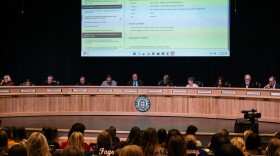President Obama visits a solar cell factory in California on Wednesday, touting a federal loan guarantee that is helping the company to add jobs.
The visit is part of a broader push by the White House to promote alternative forms of energy. But in the wake of the massive Gulf oil spill, some observers say Obama is missing an opportunity for even stronger action.
The Solyndra company in Fremont, Calif., was one of the early beneficiaries of Obama's support for green energy. Last year, the federal government guaranteed a $500 million loan for the company that, White House economic adviser Jared Bernstein said, is allowing Solyndra to build a new solar cell factory employing 3,000 construction workers and creating 1,000 permanent jobs.
"But what's happening at Solyndra isn't just about new jobs today. It's about new industries tomorrow," Bernstein said. "What's more, these new industries are in the business of clean, renewable energy, thus invoking environmental benefits while reducing our dependence on foreign imports of fossil fuels."
Alternatives In Focus
The administration wants to do more to encourage alternative forms of energy, including solar, wind and nuclear power. It has asked Congress to expedite funding for additional loan guarantees.
Obama also called last week for higher fuel economy standards for cars and trucks of the future. He said it's important to stretch every gallon of oil as far as it can go.
"The disaster in the Gulf only underscores that even as we pursue domestic production to reduce our reliance on imported oil, our long-term security depends on the development of alternative sources of fuel and new transportation technologies," Obama said.
But the president acknowledged it would take more than higher fuel economy standards to make the U.S. a leader in green energy. He repeated his pledge to work with Congress to pass a broad energy and climate bill.
Political adviser David Axelrod said on MSNBC this week that effort could get a lift from the oil spill.
"I would like to think that this will increase the sense of urgency in Congress because it underscores the value in developing alternative sources of energy," Axelrod said. "So I hope that it will give added impetus. We're going to press very hard."
Approach Criticized
But some have questioned whether the administration is pressing hard enough.
New York Times columnist Thomas Friedman accused the president of a "Bush-level failure of imagination." He wrote that just as President Bush squandered an opportunity to remake energy policy with a gasoline tax after the Sept. 11, 2001, attacks, Obama is failing to capitalize on the April 20 oil spill that continues to pour oil into the Gulf of Mexico.
Energy expert Michael Levi of the Council on Foreign Relations says that may be going too far.
"[Sept. 11] made terrorism and the Middle East No. 1 on every American's agenda," he said. "The oil spill has not made oil and energy No. 1 on every American's agenda this time. And that gives the president a much more difficult situation to work with."
Levi says passing a big energy bill isn't like financial regulation, where the administration successfully channeled public anger with Wall Street into new legislation. Although the public is angry at BP, he says, that won't necessarily translate into support for, say, a new carbon tax.
"It simply is not intuitively clear to anyone in this country why you need to do something that addresses coal power plants and that changes electricity rates because of an oil spill in the Gulf of Mexico," Levi said.
Obama said last week he's encouraged by the efforts of Democratic Sens. John Kerry (D-MA) and Joe Lieberman (I-CT) to craft an energy and climate bill. But the lone Republican who had been working on that effort, Sen. Lindsey Graham (R-SC), withdrew his support.
The president had hoped to win some GOP backing for an energy bill by including an expansion of offshore oil drilling. But with claims about the safety of deep-water drilling now discredited, that bargaining chip is very much in doubt.
Copyright 2022 NPR. To see more, visit https://www.npr.org. 9(MDAzMjM2NDYzMDEyMzc1Njk5NjAxNzY3OQ001))






